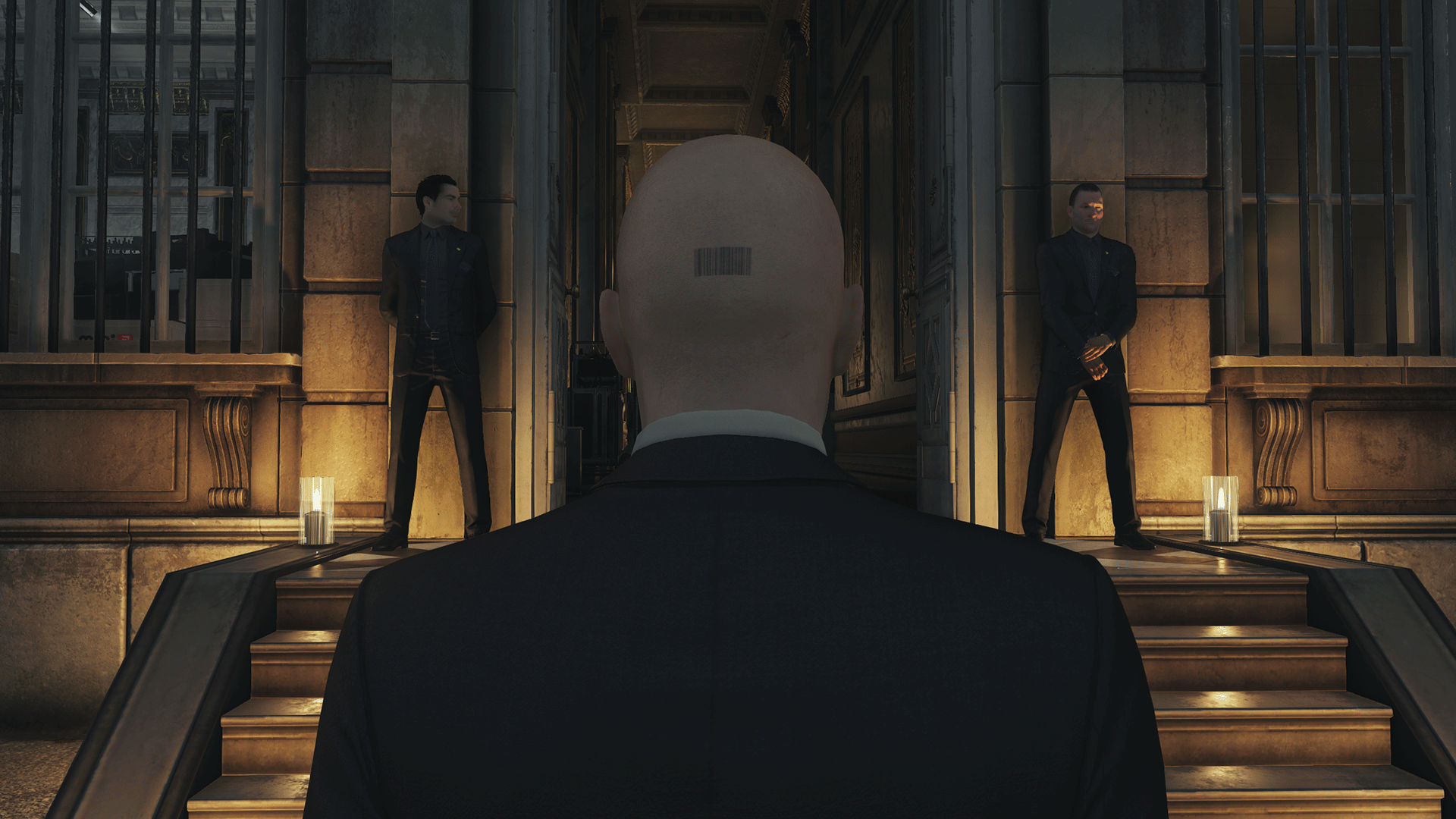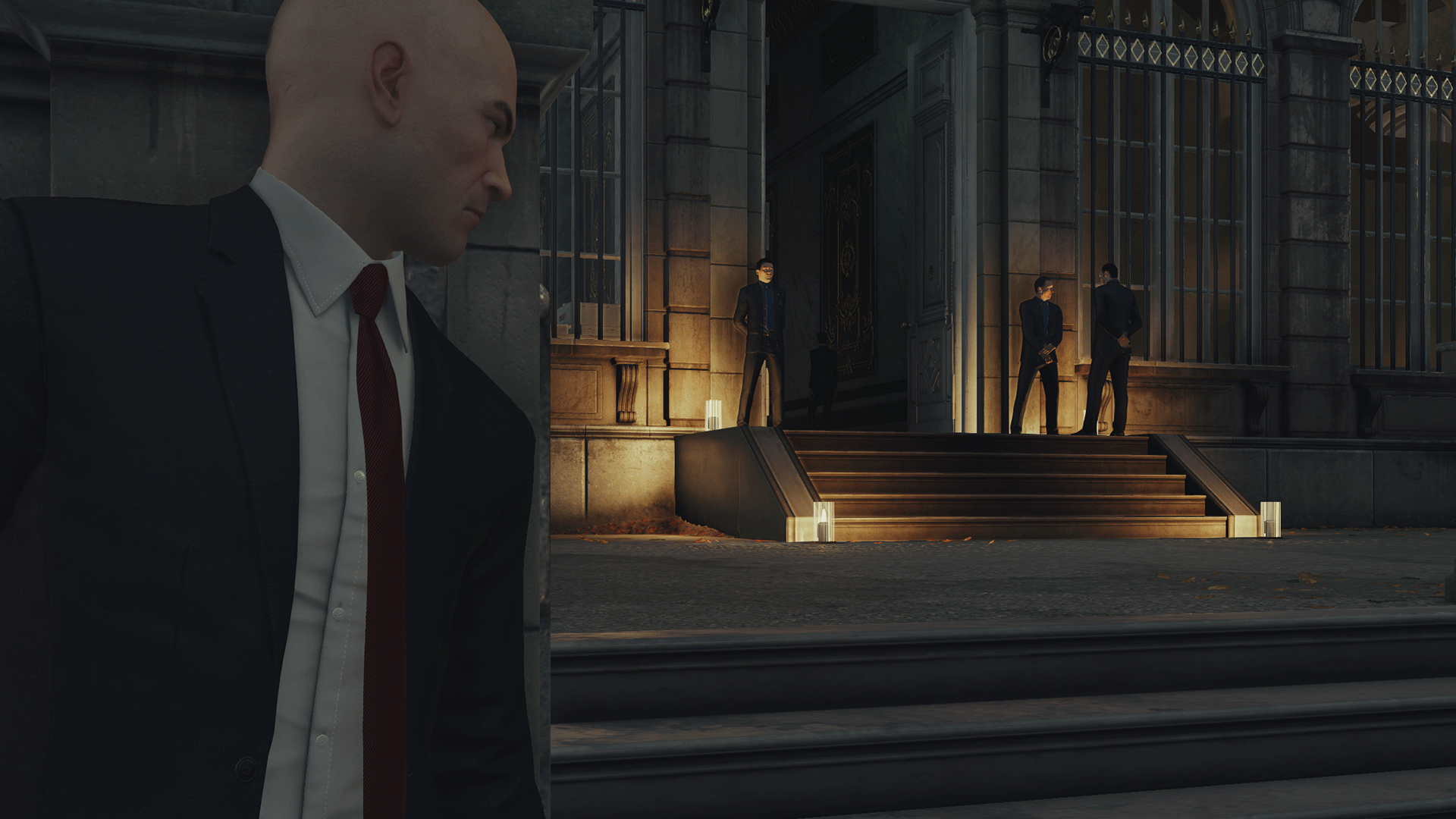Hitman's NPC AI could mean a return to form for Agent 47

There was a moment, right at the start of Hitman's Gamescom presentation, where Agent 47 walks in front of a news broadcaster's camera. She cuts the take, and mutters something under her breath about the interruption. It's a seemingly small, insignificant moment, but one that's on my mind as I interview Io Interactive's studio head, Hannes Seifert. I ask him about the new game's AI, and his response gives me hope that the new Hitman could be the best one yet.
"Let’s say you drop a weapon somewhere. A guard seeing the weapon will go there and check it out. If it's a bomb, he will disarm it. He will bring it to the armoury in the basement. It means that you can make guys smuggle stuff in for you." Similarly, if you drop a weapon in front of a civilian on his way towards your target, they'll instead run to get a guard—who will then come and remove the weapon. It's a way to manipulate the NPCs in such a way that you're given a clear path to your target. "You've interrupted two people," Seifert says. "One who might have been on their way to talk to your target, and the security guard who might have been guarding the route that allowed you to get to him."
"When you combine these things—we see this when players play the early builds—they do the weirdest combinations of that," Seifert says. Players have a number of tools at their disposal. They can tamper with food or drink, making NPCs sick. They can tranquillise NPCs and steal their clothes. The characters that Agent 47 is interacting with will have specific reactions to what happens around them. "Walk on the catwalk during the show, and the security will grab you and bring you down from there," Seifert continues.

"That’s the essence of Hitman, right? We're trying to create a procedural world where everything you do has an impact." Kill a model on a catwalk during the show, and the audience will react. Trigger a fire alarm, and the building will be evacuated. Fireman will search the area, and if they don't find a body or weapon, they'll turn off the alarm and usher people back into the building. "You just paused the fashion show for ten minutes, but they will continue doing their stuff, and you might have gained an opportunity to hide something, to modify something. This is what Hitman is about. It’s a creative stealth-action game."
This has always been my favourite thing about the Hitman series. They're violent games, but they're not about the violence. The best Hitman levels are intricate puzzle rooms that encourage you to learn the systems and patterns, and manipulate NPCs to achieve the desired result. After a while, I don't even see these characters as people, but as actors to be unknowingly directed based on my own needs. That's probably how psychopaths feel all the time.
"If you kill all the waiters, eventually these structures break down."
"That’s the thing," says Seifert, "what we build is systems. We do not really determine the things that happen. We teach the AI what to do." Seifert uses the example of a waiter. "The waiter carries food from A to B, making sure there’s always enough food or drinks for the guests. Now take out this waiter. What will happen is, in the kitchen, the food will pile up and, in the bar, the food will run low. Another waiter will see that and start taking the food." So far, so good, but what happens if you kill all of the waiters? "The supply of food will just slow down. If you kill all the waiters, eventually these structures break down and it modifies the level again, because then the guests are hungry and will try to find food somewhere else."

I'm not entirely sure how guests searching for food in the wake of a waiter massacre is supposed to help 47 complete his mission, but I like that it's a thing I'll be able to do. I ask Seifert exactly how this is being implemented. Are its NPCs individuals with specific needs, or assigned a type of behaviour that dictates how they act?
Keep up to date with the most important stories and the best deals, as picked by the PC Gamer team.
"You could call them character classes," he says. "So guards have a different need—to protect an area, or, for a bodyguard, to protect a person—than the party guests might have." NPCs will also have specific goals, designed to make them interesting potential targets for Hitman's returning Contracts mode. "It means they have a generic behaviour, and then they also have something specific," Seifert says. It may be that two NPCs are going to meet and exchange an item at a specific time, or that another is carrying a box between two locations. "That is how our logic works. Our level design is very elaborate. Our quality control is very elaborate. But the most important thing is that the systems feel robust so they can actually work with each other without breaking."

Phil has been writing for PC Gamer for nearly a decade, starting out as a freelance writer covering everything from free games to MMOs. He eventually joined full-time as a news writer, before moving to the magazine to review immersive sims, RPGs and Hitman games. Now he leads PC Gamer's UK team, but still sometimes finds the time to write about his ongoing obsessions with Destiny 2, GTA Online and Apex Legends. When he's not levelling up battle passes, he's checking out the latest tactics game or dipping back into Guild Wars 2. He's largely responsible for the whole Tub Geralt thing, but still isn't sorry.

